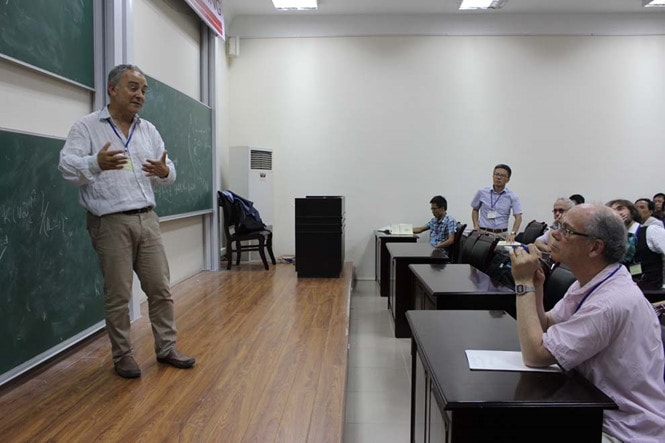How do countries around the world confer the title of Professor?
According to many experts, in different countries, although the history of university education is different, the concept of professor has something in common: a working position in a university.
Universities decide for themselves
According to Professor Phung Ho Hai, Director of the Institute of Mathematics, Vietnam Academy of Science and Technology, in Germany, the position of Professor must be at a university or research institute. The development process of a scientist from PhD to Professor must first go through a period of post-doctoral internship (lasting from 3 to 6 years). At the end of this period, they will complete another thesis to demonstrate the perfection of their research capacity, and then be officially allowed to teach at the University.
 |
| International professors come to work at the Institute for Advanced Study in Mathematics. Photo: Lan Anh |
However, to be appointed to the title of Professor, scientists must spend several years as contract lecturers to accumulate enough achievements to run for the position of Professor. This entire process depends entirely on the decision of the University based on the proposal of the faculty.
For each university, the number of professors is fixed. Professor salaries are taken from the state budget, but the principal has full authority to appoint them. They only recruit when there are “quotas” left. Recruitment information is announced publicly at home and abroad. They will set up a selection board to evaluate each candidate, and the person with the highest score will be selected and appointed as a professor until retirement. Although the university has the right to select professors, it does not have the right to fire them because once they become professors, they are “state employees”.
Professor Hai said: "No German university has set a set of strict standards to evaluate its professor candidates, but for basic science fields, the common principle is the candidate's scientific research achievements."
Professor Vu Ha Van, Yale University (USA), said that in Vietnam today, conferring the title of Professor is considered a way of honoring, similar to the title of Meritorious Artist or People's Artist. "The irony is that many people with the title of Professor do not work in universities or research institutes, and do not even do research. So in Vietnam, there is a habit of only introducing someone as a Professor, but rarely saying where they are a Professor. This is very different from the international situation. I support the option of allowing schools to appoint Professors themselves. The status of Professors in society will be indirectly affirmed through the position of the school they work at and their conferring process."
Professor Recruitment
In many conversations with Thanh Nien Newspaper reporters, Professor Ngo Bao Chau said that the academic labor market in the US is very dynamic, somewhat fierce, due to the continuous elimination mechanism thanks to the very active recruitment and personnel exchange process. “Professor is a position in training and research institutions. Therefore, it has a certain number of quotas, when there is a shortage of quotas, they will recruit new people,” Professor Ngo Bao Chau said.
Because each time each faculty only considers 1-2 cases, they have time to review the candidate's profile very carefully. Of course, they never care about quantified criteria like what Vietnam is doing, such as having enough international articles, or the number of books written, the number of PhDs trained... because in the context of university education in the world today, those numbers are not very meaningful. "Usually, they consider the influence of the person they want to recruit on the research field that the faculty wants to promote. They will send a letter asking for opinions from leading experts in the global scientific network. Usually, it takes the evaluation of about 10 experts. On the part of the experts, they evaluate very carefully and consider each specific case, not giving a standard table and ticking each box and giving a score rigidly like in Vietnam," said Professor Ngo Bao Chau.

97 professor and associate professor profiles must be reviewed
As of last night (February 28), the State Council for Professor Titles has temporarily left behind 97 professor and associate professor profiles.
Don't associate professors with political careers.
Dr. Nguyen Xuan Huy, University of Technology - Ho Chi Minh City National University, said that in Asian countries, the title of Professor is always a job position, which must be recruited and appointed by the universities themselves, not by the title council as in Vietnam. Depending on the candidate's capacity and professional experience, the university's professional council recruits and evaluates each candidate to see if they are suitable for the university's development direction or not. From there, they will appoint a job position that is suitable for the job requirements.
According to Dr. Huy, most professors at Korean universities have PhDs from famous schools in the US or Europe. The conditions for becoming a professor in Korea are fiercely competitive, with the usual criteria being as follows: having a PhD from famous schools in the US, Canada or Europe; having research experience, having at least 5 years of post-doctoral work; having many international publications in SCI journals; having been the head of a research project.
Universities in Korea recruit professors from powerful people who have long-term experience working in government organizations. These people, when they return to their universities to become professors, will bring many research projects to the school.
“This is the difference between Korea and Vietnam. In Korea, after finishing their political or government jobs, they return to school to become professors and focus on teaching students and doing research projects. Meanwhile, in Vietnam, many people with the title of professor work in ministries, branches, and state agencies, not focusing on working in universities,” Dr. Huy commented.


